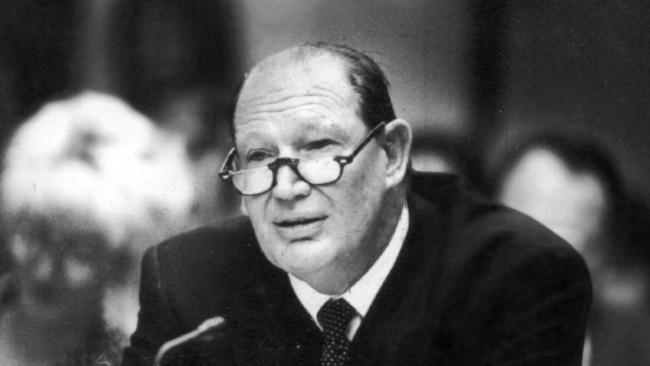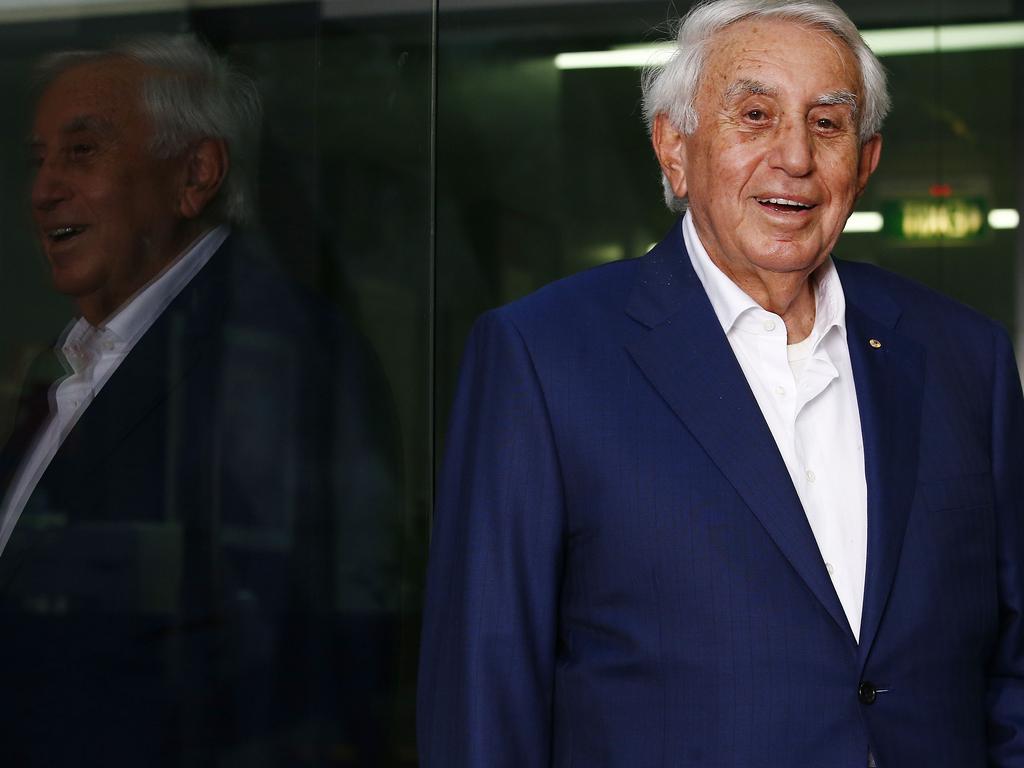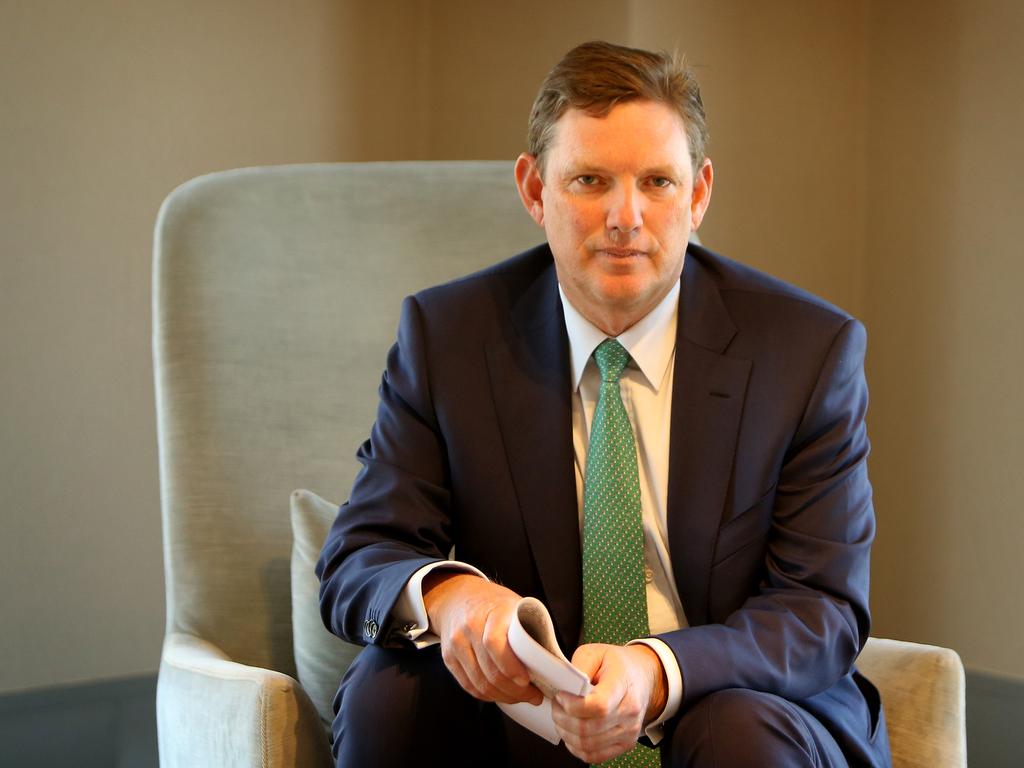Selling NBN would be an act of national vandalism
In your most lurid fantasies, could anyone have seen Peter Costello as chairman of a combined Nine and Fairfax?

Then ANZ chief executive Will Bailey ticked off on the loan to fund the bid over the phone. Ah, those were the — crazy — days of the 1980s; we are of course so much more financially sober and rigorous these days.
But before Young Warwick’s bid was locked in came that fateful day in October when the market plunged 25 per cent in a single day, indeed in a single quarter of an hour at the open.
Young Warwick had a chance to walk away. Blinded by emotion, ambition and ignorance and spurred on by his mother Lady Mary, he didn’t take it and the rest would be history.
We got decades of juicy news in and around Fairfax and a seemingly endless parade of characters, swirling around and through what seemed a fatted calf for any and all to feast on.
There was Conrad Black, Kerry Packer and a young and very thrusting Malcolm Turnbull at the start when the debt-laden Fairfax of Young Warwick imploded.
In what must surely be the most bizarre twist of the entire three-decade-plus saga, during this past week we saw Peter Costello presiding at the AGM over the now-combined, if much reduced, former Packer-Nine and Fairfax empires.
How bizarre? Have a look at the video of a very young Costello crossing verbal swords with a very intimidating Packer over his bid to buy Fairfax, at that famed House of Reps committee inquiry in 1991 — the venue for possibly the two most famous Packer quotes.
The first was: “You’re either gonna have to believe me or call me a liar.”
The second: “Of course I’m minimising my tax. If anybody in this country doesn’t minimise their tax they want their head read. As a government I can tell you you’re not spending it that well that we should be paying extra.”
In your most lurid fantasies, after that, could you come up with any scenario which ended with Costello as chairman of even Nine alone, far less Nine and Fairfax combined?
Why, you might more easily have predicted — remember, we are talking 1991 — that a then-”yesterday politician” named John Howard would yet, one day, become Australia’s second-longest serving prime minister.
What killed Young Warwick’s Fairfax was the 18 per cent interest rates — on that $2bn of debt — and the crushing and extended recession they delivered. It proved to be a time precisely not to borrow and buy assets.
Well, a third of a century later, exactly the opposite now applies and much more pervasively across the financial and asset landscape.
This is precisely the time to be borrowing and acquiring. It is also the time to be very reluctant to sell an asset — whether a private shareholder in a company like Coca-Cola Amatil or Link, or the federal government as proxy owner (on behalf of all of us, taxpayer and non-taxpayer alike) of the National Broadband Network.
The reason is of course both near-global and near-permanent zero policy and near-zero borrowing interest rates and the tens of trillions of dollars of bank and investment liquidity.
Global governance — by that I mean political government and central banks — have given a combined commitment to long-term sustained asset inflation: property and shares.
So anyone selling an asset is really making two decisions: to forgo future and usually tax-advantaged capital growth and to opt instead for zero-income zero-capital growth cash.
It seems to me that boards and — perhaps — advisers have failed to catch up with this reality. The pervasive mindset remains of valuations, PE ratios and required rates of return very much in yesterday’s world.
One tangential example is the way that banks might have given up on 15-20 per cent returns on equity, but still are aiming at 10-15 per cent returns.
Now, I slapped the qualification on “advisers” because they, or some of them, might understand what this new reality should be doing to valuations, but they have an “interest” in promoting transactions, not counselling against them.
The big one in all their sights is the NBN.
To me, any sale of the NBN anytime soon would be an act of unconscionable national vandalism; it would also be just quite astonishingly stupid.
Without re-entering debate with what I term the “gigabyte geeks” – who demand the all-fibre equivalent of a four-lane freeway to every hamlet and hovel across the most sparsely populated landmass on the planet bar only Antarctica and soon to be green-again Greenland — this NBN is now the single most important foundational infrastructure for the Australia of the 21st century.
For that reason alone it must remain publicly owned. Selling it would initiate a replay of the corrosive mess we got into by selling Telstra into the private sector with its monopoly core (20th century) telco infrastructure. But what would make it now crass beyond belief is this reality of near zero interest rates and, perhaps surprisingly, the very fact of permanent budget deficits and ever-rising federal government debt.
However it is treated in accounting terms, any – all – money the government has put into the NBN is borrowed. So any money on its sale would be a reduction of its debt.
On the most basic level, it is ludicrous to suggest that selling the NBN and thereby reducing the likely end-2020s debt from, say, $1.5 trillion to “only” $1.48 trillion will be of any meaningful benefit to anything. But even more powerfully the new reality applies to government just as much as individuals: this is the time to be borrowing and buying assets; you should only — as a broad generalisation — sell any asset at a “super premium”.
Indeed, if the government did not already own the NBN it should be desperately moving to borrow the money to buy or to nationalise it.








In 1987 Young Warwick Fairfax launched his $2bn bid to reclaim what he saw as his birthright by taking over John Fairfax — then the richest and most powerful media organisation in the country, thanks to its “rivers of classified advertising gold”.